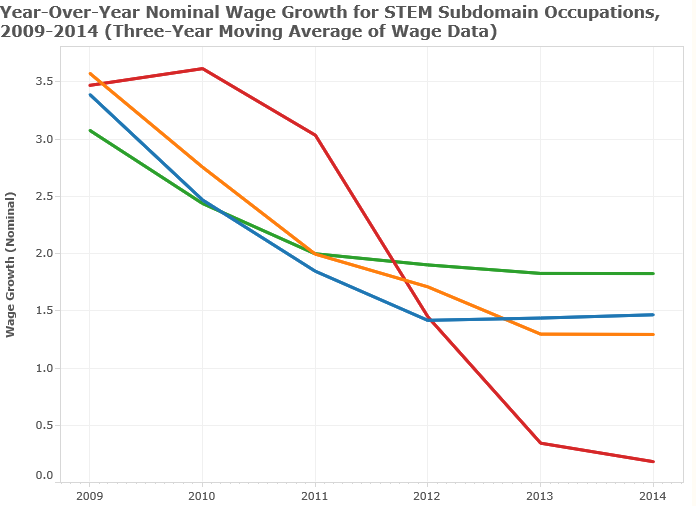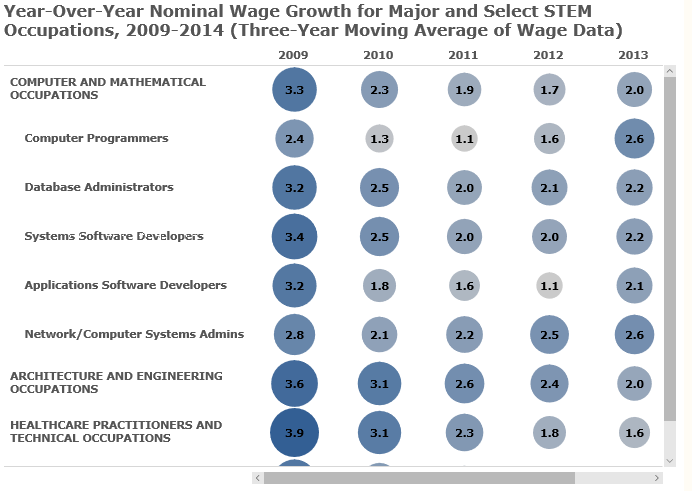In 2010, less than 15 percent of new Ph.D.’s in science, engineering, and health-related fields found tenure-track positions within 3 years after graduation. For Ph.D.’s in the life sciences, the figure was an even smaller 7.6 percent. Most who want an academic career join academia as postdocs or adjunct faculty, hoping to vie for a tenure-track faculty position in the future.[/B]
Similarly, the National Academy of Sciences Committee, charged with identifying the needs of the U.S. DOD and the U.S. defense industrial base, found that DOD representatives almost unanimously stated that there was no STEM workforce crisis, but that there were specific areas in which needs were not being met.
One recruiter we interviewed said he found that many chemical engineering college graduates were seeking employment in software development. Among young Ph.D.’s, the situation was even worse: just 38 percent of newly minted chemistry Ph.D.’s were employed in full-time, nonpostdoc positions in 2011, down from 51 percent in 2008. New chemical engineering Ph.D.’s fared better, with a full-time, nonpostdoc employment rate of 61 percent.
Lots of unemployment and underemployment for PhDs....in STEM.....
A considerable number of physics Ph.D.’s are unemployed, accepting postdocs and other temporary positions (69 percent in 2010, as opposed to 51 percent before the dot-com bust), indicating that the demand for physics Ph.D.’s is not high.
ouch, why even go in STEM with these stats....
As the government problem with security clearances, it could be solved.
Another recruiting manager for a government research institute found difficulties hiring those with advanced degrees in computer sciences and computer engineering. Because of budget stipulations, salaries his institute offered could not compete with those in the private sector.
In the areas where they need people, they don't offer competitive salaries. Hmmmm...
Anyway, I already posted an article on
Disney dumping programmers for guest workers, but no one posted on it. It came from the NY Times.... The entire H1-B scam is largely a fraudulent effort to keep wages down and get programmers who can't complain or leave. Very feudalistic...
Here is another source
http://www.theatlantic.com/education/archive/2014/03/the-myth-of-the-science-and-engineering-shortage/284359/, which I read 2 years ago. The author wrote a book on the subject.
The truth is that there is little credible evidence of the claimed widespread shortages in the U.S. science and engineering workforce. How can the conventional wisdom be so different from the empirical evidence? There are of course many complexities involved that cannot be addressed here.
...
A compelling body of research is now available, from many leading academic researchers and from respected research organizations such as the National Bureau of Economic Research, the RAND Corporation, and the Urban Institute. No one has been able to find any evidence indicating current widespread labor market shortages or hiring difficulties in science and engineering occupations that require bachelors degrees or higher, although some are forecasting high growth in occupations that require post-high school training but not a bachelors degree. All have concluded that U.S. higher education produces far more science and engineering graduates annually than there are S&E job openings—the only disagreement is whether it is 100 percent or 200 percent more. Were there to be a genuine shortage at present, there would be evidence of employers raising wage offers to attract the scientists and engineers they want. But the evidence points in the other direction: Most studies report that real wages in many—but not all—science and engineering occupations have been flat or slow-growing, and unemployment as high or higher than in many comparably-skilled occupations. bless
Because labor markets in science and engineering differ greatly across fields, industries, and time periods, it is easy to cherry-pick specific specialties that really are in short supply, at least in specific years and locations. But generalizing from these cases to the whole of U.S. science and engineering is perilous. Employment in small but expanding areas of information technology such as social media may be booming, while other larger occupations languish or are increasingly moved offshore. It is true that high-skilled professional occupations almost always experience unemployment rates far lower than those for the rest of the U.S. workforce, but unemployment among scientists and engineers is higher than in other professions such as physicians, dentists, lawyers, and registered nurses, and surprisingly high unemployment rates prevail for recent graduates even in fields with alleged serious “shortages†such as engineering (7.0 percent), computer science (7.8 percent) and information systems (11.7 percent).
Another good article
from the Center for Economic Policy and Research. It even has fun charts!!!!!
Michael Hiltzik at the Los Angeles Times recently reported on the much-talked-about shortage of STEM workers, or workers in fields that predominantly deal with science, technology, engineering, and mathematics (STEM). He notes that many studies indicate that the shortage of STEM workers is imagined. He also discovered that many of the companies that complain about their inability to find STEM workers are, paradoxically, laying off large numbers of them.
It is difficult to believe that there is a shortage of these workers when there is a substantial amount of slack in the labor market. More than seven years after the start of the Great Recession, the employment-to-population ratio, or employment rate, is still down 2.5 percentage points for prime-age (25 to 54) workers.
Like other supposed labor shortages, if there were a real shortage, wages would be expected to grow. This is because employers would compete over a small number of workers, and they would need to raise wages to attract those workers.
Wage growth for all of these subdomains fell after the Great Recession and none have recovered. All are under 2.0 percent, with wage growth in the Social Science Subdomain close to zero. It’s important to note that this is nominal wage growth, so we would expect real wage growth to be even lower.
The general trend is that nominal wage growth is lower now than it was in 2009, with the exception of Computer Programmers, who saw low wage growth in 2009. Wage growth is low-to-moderate, under 3.0 percent for all groups.
This wage data suggest that there is not a shortage of STEM workers broadly, or for commonly discussed computer occupations.
One reason employers might think they can’t find workers is that they may have inflexible requirements for vacant positions. For example, a company might require that workers work for low wages and long hours, or that they have particular certifications or unreasonably specific skills, or vague cultural attributes that favor certain types of people. There might also be an unwillingness to train new workers on-the-job, which was very common in the past.
So when employers complain about not being able to find workers, what they really mean is that they can’t find workers who meet their requirements at the wage they are willing to offer. With the cost of living rapidly rising in areas like San Francisco, where there are many STEM employers, it makes sense that workers would not apply for positions that offer wages they find to be too low.
The story is then not that there are too few STEM workers, but that employers will say they can’t find workers in order to increase the bargaining power that they have and hopefully lower their labor costs. Employers are increasingly pushing for policies shift training costs onto the public and to expand H1B visas, which Hiltzik mentions. Some STEM employers are so desperate to reduce labor costs they even collude to keep down their employees’ wages.
The data indicate that Hiltzik is right to suspect that the STEM shortage is phony. The real story is that employers want to pay workers less.
Here are the charts
Anyway, the empirical data shows that there is no storage of STEM workers, but STEM jobs. Employers are trying to keep wages as low as possible. Stem PhDs are facing massive unemployment.
Instead, there is only a shortage of a willingness to pay the wage. Everything else is Kabuki theater as billionaire CEOs decry artificial shortages so that they can continue to underpay workers by radically increase the supply through guest worker and immigration.
Given the world today, if companies need foreign workers, they can easily have the work in the foreign country itself. Personally, I have worked for a Dutch company with workers in India and England supporting a project in America, on behalf of clients in Brazil...... I have also worked on a project in America for a Swiss company over a matter that was in Australia, which needed some special work for conference calls from 3 different continents.... Just another day in an interconnected world.
Of course, employers play the credentialing game as well, sometimes requiring such things as 10 years experience for a computer language 3 years old, just so they then justify a H1-B.
Anyway, whatever very narrow areas that are lacking in workers can be solved by either training people who are in related fields with limited employment possibilities, or actually increasing wages. Once upon a time in America, wages increased with productivity. Then employers started offshoring or importing cheaper labor......
Again, none of this relates to Fi directly or the desire for diversity or whether any of that is good for society. But, the alleged STEM shortage just demonstrates the Big Lie theory. Conventional wisdom is just so often based upon lies, unfortunately. Good thing real data exists.



 I don't know never really sat down and considered people developed morals different ways. but mine is based on experience and the idea of no one is exactly the same so what that person needs is not the same as what you or i need not that that person is defective or less than but more just different its like being in a flat field and there's lanes and that person is in the lane next to you but he only sees whats in his lane and you only see whats in your. i lost my train of thought but yeah. basically and i didnt realize it until i was older that my morals was shaped by star trek and dr.who which were shows my dad watched. i've rewatched them recently and am like woah. for example the needs of the many outweigh the needs of the few. like if something is good for the group but i dislike it on a personal level i'll do what is good for the group and ignore my needs. but yeah i think i lost the orignal premise, sorry.
I don't know never really sat down and considered people developed morals different ways. but mine is based on experience and the idea of no one is exactly the same so what that person needs is not the same as what you or i need not that that person is defective or less than but more just different its like being in a flat field and there's lanes and that person is in the lane next to you but he only sees whats in his lane and you only see whats in your. i lost my train of thought but yeah. basically and i didnt realize it until i was older that my morals was shaped by star trek and dr.who which were shows my dad watched. i've rewatched them recently and am like woah. for example the needs of the many outweigh the needs of the few. like if something is good for the group but i dislike it on a personal level i'll do what is good for the group and ignore my needs. but yeah i think i lost the orignal premise, sorry.